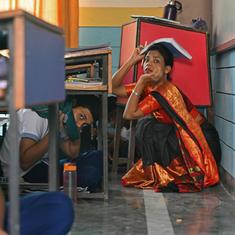Assembly polls: Maharashtra to vote on November 20, Jharkhand in two phases, results on November 23
The Model Code of Conduct came into force in both states with the announcement of the election schedule.

Assembly elections in Maharashtra will take place in a single phase on November 20, the Election Commission announced on Tuesday. The voting in Jharkhand will be conducted in two phases on November 13 and November 20.
The counting of votes will take place on November 23.
The term of the Legislative Assembly in Maharashtra will end on November 26, while that of the Jharkhand Assembly will end on January 5.
The Model Code of Conduct came into force in both states with the announcement of the poll schedule.
The code is a set of guidelines issued by the poll panel that political parties, candidates and the government must follow during an election. It sets guardrails for speeches, campaigning, meetings, processions, election manifestos and other aspects of the polls.
The Election Commission on Tuesday also announced the schedule for the bye-elections in 48 Assembly constituencies and two Lok Sabha seats in 15 states.
Polling in 47 of these Assembly constituencies and Kerala’s Wayanad Lok Sabha seat will take place on November 13.
Congress General Secretary Priyanka Gandhi Vadra will make her electoral debut by contesting from Wayanad. Rahul Gandhi had won from both Rae Bareli and Wayanad in the 2024 Lok Sabha elections but could only retain one of the seats according to the provisions of the Representation of People Act.
The voting in the Kedarnath Assembly seat in Uttarakhand and the Nanded Lok Sabha constituency will be conducted on November 20.
The counting of votes in the bye-polls will also take place on November 23.
In most cases, the bye-elections were necessitated as some of these seats fell vacant when their MLAs were elected as MPs in the recent Lok Sabha elections. In one constituency of Uttar Pradesh, bye-poll will take place as the sitting MLA was disqualified.
Maharashtra
In Maharashtra, 9.6 crore voters are on the electoral rolls. The state will have one lakh polling stations in more than 52,700 locations, the Election Commission said.
Maharashtra has witnessed a tight political battle between the ruling Mahayuti alliance and the Opposition Maha Vikas Aghadi bloc in the past five years.
The Mahayuti comprises mainly the Bharatiya Janata Party, the Chief Minister Eknath Shinde-led faction of the Shiv Sena and Deputy Chief Minister Ajit Pawar’s Nationalist Congress Party group.
The Maha Vikas Aghadi primarily includes former Chief Minister Uddhav Thackeray’s Shiv Sena faction, the Congress and the Nationalist Congress Party group led by party founder Sharad Pawar.
In the 2019 Maharashtra polls, the Bharatiya Janata Party won 105 seats in the 288-member Assembly. The undivided Shiv Sena, its ally at the time, won 56 seats.
The united Nationalist Congress Party won 54 seats while its ally, the Congress, won 44 seats.
After the poll results, the Thackeray-led undivided Shiv Sena quit its alliance with the BJP and formed the state government along with a united Nationalist Congress Party and the Congress.
The Maha Vikas Aghadi coalition government collapsed in June 2022 when a group of Shiv Sena MLAs led by Shinde rebelled and formed a government with the BJP. This split the Shiv Sena into two factions, with one led by Thackeray and the other by Shinde who became the chief minister.
A year later, Nationalist Congress Party leader Ajit Pawar, along with several party MLAs, also joined the ruling coalition. This split the Nationalist Congress Party, with one faction supporting Sharad Pawar and the other backing his nephew Ajit Pawar.
In the Lok Sabha elections this year, the first major polls in the state since these developments, the Maha Vikas Aghadi won 30 of the 48 seats in the state. The remaining 18 seats were won by the ruling Mahayuti alliance.
The two alliances each secured a 43% vote share in the general election.
Jharkhand
In Jharkhand, 2.6 crore voters are on the electoral roll. The state will have more than 29,500 polling stations in over 20,200 locations, the Election Commission said.
In the 2019 Jharkhand polls, the Hemant Soren-led Jharkhand Mukti Morcha won 30 seats in the 81-member Assembly. Its ally, the Congress, won 16 seats. Another ally, the Rashtriya Janata Dal, had clinched one seat.
Hemant Soren became the chief minister of the coalition government.
The BJP, which was in power in the state between 2014 and 2019, won 25 seats.
On January 31, Hemant Soren resigned as the chief minister hours before his arrest by the Enforcement Directorate in a money-laundering case. Champai Soren, a senior leader of the Jharkhand Mukti Morcha at the time, took over the post.
Hemant Soren returned as the chief minister in early July after the Jharkhand High Court granted him bail. Champai Soren joined the BJP in late August, saying he had been “embarrassed” by the Jharkhand Mukti Morcha.
In the Lok Sabha polls, the BJP-led National Democratic Alliance won nine of the 14 seats in Jharkhand. The Opposition INDIA bloc, which includes the Jharkhand Mukti Morcha and Congress in the state, won five seats.









